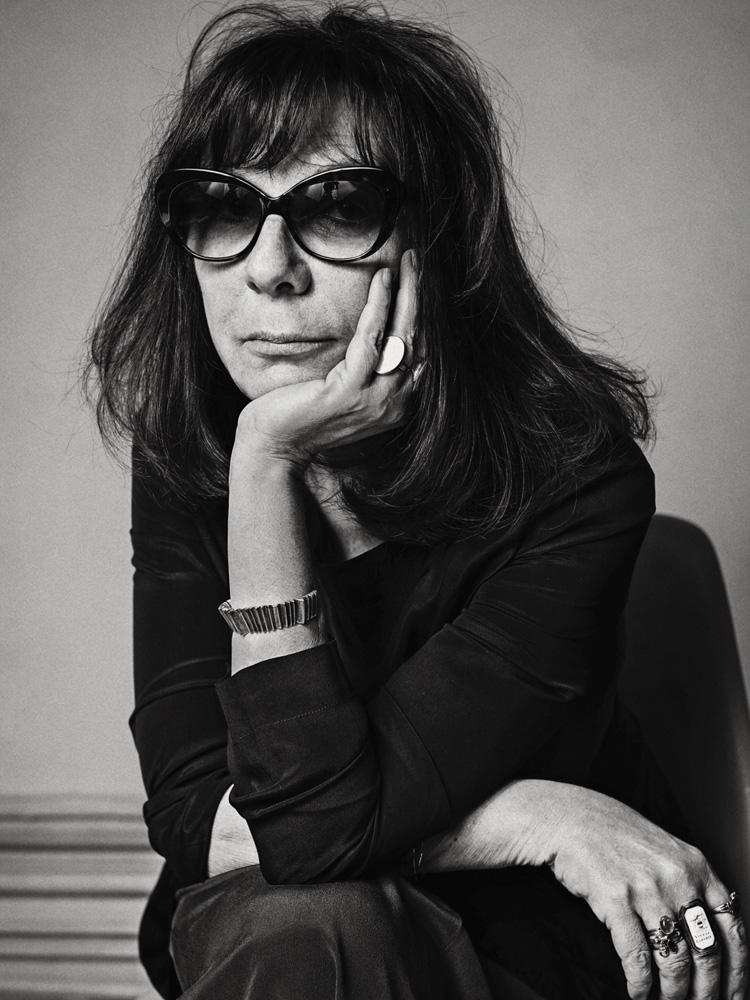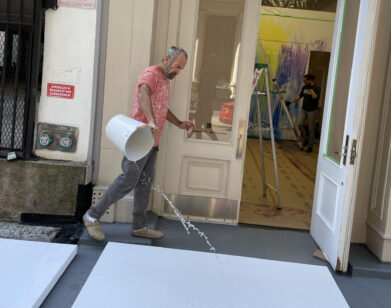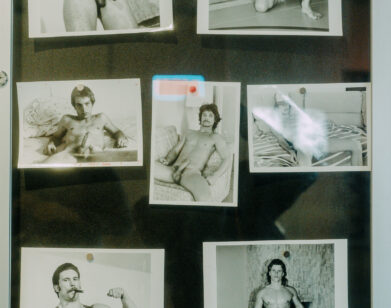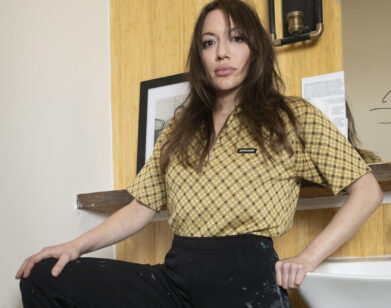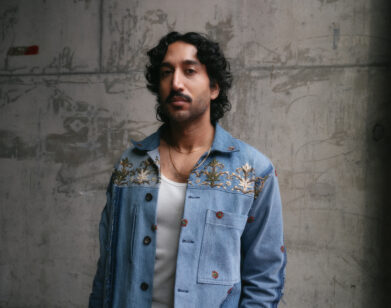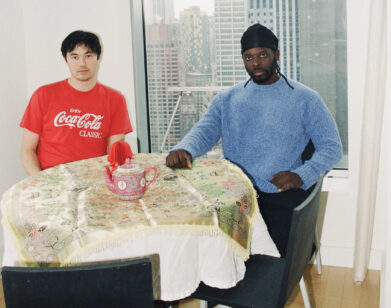Sophie Calle
I am obviously more attracted to things missing, or to something that is not there more than something that is there. Sophie Calle
Sophie Calle and I Skyped on a mid-March day, me in New York with snow outside my windows, Calle in Paris with leaves outside hers. She wore sunglasses and a flowered dress. I wore the sweater of a dead French actress I bought on eBay and a seal vertebra around my neck. I was dressed to talk about death and the objects of dead people. She was dressed for the beach. The infamously intrusive and distant 60-year-old Sophie Calle proved to be disarmingly nice and generous and wise. She showed me around her apartment. When she talked about her projects—even those that earned her the cold / distant / intrusive reputation that wasn’t, on my computer screen at least, much in evidence—she seemed emotionally invested nearly to the point (but certainly not to the point) of sentimentality.
Calle’s mother is the subject of her recent project, Rachel, Monique, which opens this month at the Episcopal Church of the Heavenly Rest in New York. Calle spoke of her mother’s loneliness. Calle may not fear loneliness, but something drives her to connect with strangers, and often in a fast-forwardly intimate fashion. She has invited strangers into her bed. She’s spent a night atop the Eiffel Tower while bystanders told her bedtime stories to keep her awake. Sleep is the ultimate isolation from others. Rachel, Monique includes a film of her mother on her deathbed. The camera she set up in her mother’s room tracks a person disappearing into the loneliest sleep of all.
I’d wanted to ask Calle if she were an insomniac. I’d wanted to ask her if she’d ever caught her mother having sex. I’d wanted to ask her why we don’t taxidermy our dead loved ones. Because I’d expected her to be brusque and impatient, I prepared questions that were tough and outrageous. Then she appeared in sunglasses and showed me her collection of dried flowers. We talked about loss, how I’m a habitual loser of objects and she never loses anything (unless she’s burying it, on purpose, in a glacier). She had nothing but sensible things to say about basically everything. Immediately afterward, I sent her an e-mail, because I’d written hers on a scrap of paper I knew I’d misplace. She wrote back: “If you lose my address, I won’t lose yours.”
HEIDI JULAVITS: I know that you grew up next to the Montparnasse cemetery in Paris. You liked to hang out there and read.
SOPHIE CALLE: There was nothing morbid about it. It was just the closest green. It was a nice playground because there were flowers and statues, silence. It was a very natural place.
JULAVITS: I grew up next to a cemetery. We used to play and read there too. We found a lot of abandoned pornographic novels. Did you develop relationships with any of the dead people?
CALLE: When I was very young, like 10 or 11 years old, yes, I did. I invented a man hidden in a grave. I told this story in my work called The Shadow [1981]. I would bring food to him every day, and obviously the cats would eat the food. [laughs] That was long ago.
JULAVITS: I go to cemeteries now and talk to people. There’s a famous writer named E.B. White buried near my house in Maine, and I frequently go and tell him what’s still being said about his work. I’m curious, did you keep a diary when you were young?
CALLE: I did. I stopped keeping a diary when I started to be an artist. The text went into something else. I kept my stories for my artwork. But even then it was more a diary with drawings, with photos, with articles from the newspaper, with funny stories … It was not a real diary. Or it was the usual adolescence stuff, about the failure of love.
JULAVITS: In 2007 you were given your mother’s diaries. Were you aware that she had been keeping a diary for 20 years?
CALLE: I knew she was keeping it, but I never read it, and I was not curious about it. Despite my reputation, I can be discreet.
JULAVITS: Did she request that you wait until she died to read them, or was that your choice?
CALLE: We knew she was going to die, so we were not hiding the fact. We started to dig through her things. I asked her who I should give this or that to, like her jewelry. It was during that discussion that she said, “Take the diaries, take them all now.”
JULAVITS: I know she made comments about how you never really used her in your work. When you decided to film her on her deathbed, she said, “Finally.” Why, up to that point, hadn’t you used her?
CALLE: I don’t use my friends and family in my work! But actually she was in my work. She was one of my sleepers in The Sleepers [1979]. She hired a private detective to follow me for a day in The Shadow. But that was never enough. She wanted to be the center of the project.
JULAVITS: You’ve made works about your own romantic relationships.
CALLE: I made three works about men in my life. But I had much more than three men. I never wrote about them.
JULAVITS: Why these three men?
CALLE: Because things were going wrong, and it was a way to take a distance from that failure. But I never had the need to do something on my mother. There was no necessity to take a distance from her. My mother constantly wanted to be the center of attention. The idea for the work came when she died because I am obviously more attracted to things missing, or to something that is not there more than something that is there. And at my age, I know myself. If I make a project, it’s a way to help me. I don’t do it for therapeutic reasons, but I know that the therapy can be a side profit.
JULAVITS: Have you ever been in therapy?
CALLE: By mistake, once. Did you read about it in my autobiography? It’s the story of the bad breath.
JULAVITS: Of course! Your father told you that you had bad breath, and he made an appointment for you with a doctor who turned out to be a therapist.
CALLE: I was in therapy for about two months, but more to play with this situation that just fell on me. I like to use events that happen. So it was not out of a need or out of a desire. It just—
JULAVITS: Happened.
CALLE: In the same way that I like to marry a man because he doesn’t love me.
JULAVITS: Do you have clothes of your mother’s that you wear? What objects did you decide to keep of hers?
CALLE: I kept very little. Now that you say it, I kept too little. I kept some books that were dedicated to her. She knew a lot of writers, American writers mostly, like Bill Styron. I kept the rocking chair in which I was always with her as a baby. I hardly kept any clothes. She didn’t have good taste. [laughs] She had a lively taste, because she didn’t care and was blithe. But no, I don’t dress in her clothes or eat off her plate …
JULAVITS: I’m thinking of that photo of you wearing Freud’s coat [in the book for Calle’s 1998 project Appointment With Sigmund Freud].
CALLE: I have too many possibilities with my mother. To put Freud’s coat on me was a unique possibility.
JULAVITS: I love the expression you have on your face in that photo, like you’re getting away with something. You look naughty. Not sexually naughty, more like a child is naughty.
CALLE: I could not believe I was in it.
JULAVITS: Did you have to steal it, or did the people at the Freud Museum say it was okay for you to wear?
CALLE: No, no, they let me look in the attic. The coat was there and also his wedding ring.
JULAVITS: Wow. I think of how you use your own objects in that piece—like how you draped your wedding dress over Freud’s couch. Your objects are a way to … violate is too strong a word, but it feels like a sort of playful or cheeky violation of his private space.
CALLE: There are many Americans that were outraged—especially Americans.
JULAVITS: But that piece seems so well-intentioned on some level, like an overture toward sharing parts of yourself with a dead person.
CALLE: Some said it was provocative, but it was not a provocation.
JULAVITS: Similarly, in The Address Book [1983]—you found a man’s address book on the street in Paris, and instead of returning it to him, you contacted all of his friends and interviewed them about him—I feel like it’s a genuine, if unorthodox, overture toward connecting with a stranger. It struck me that what seemed so inflammatory when it first came out maybe wouldn’t seem so inflammatory these days. That kind of privacy sharing and inquisitiveness into people’s personal lives, everybody does it all the time. Now that so much of privacy has been made public, I’m wondering if there are aspects of privacy that still interest you as an artist.
CALLE: I don’t know, I don’t think in those terms. When an idea comes, I just step on it.
JULAVITS: You talked about being interested in absences. Strangely, when you engage in a project that seems more documentary, people forget that there are absences in that documentation. There are holes. You have been careful to leave stuff out.
CALLE: As I said, I don’t think I’m intrusive! I feel discreet. I know some people will jump in the air, saying, “Gasp!” but in The Address Book, I didn’t say everything I heard. What people say about their friends is often much worse. To some of them, I said, “You know, it’s going to be published tomorrow in the paper. Are you sure?” “Yeah, yeah. It’s no problem.” [Julavits laughs] I did that project, so I’m not going to hide and excuse myself. But I censored them more than they self-censored.
JULAVITS: I wanted to ask about burying your mother’s portrait along with her diamond ring and Chanel necklace in the glacier [North Pole, 2009].
I’ve never left my house to take a plane without writing my will. There must be about 30 wills in my drawers, everywhere. I write
wills more easily than I write love letters. Sophie Calle
CALLE: I didn’t go to the North Pole to do something about my mother. I was invited to the North Pole and I realized it was impossible to go there without thinking about her. So I found the idea, because I could not go there and not bring her. I knew how much she dreamed of going there, and I had to find a symbolic action that would bring her there. It had to be a strong gesture. I had to do something more emotional. So, to bury a diamond, the value of it—and because diamonds are supposed to be eternal—was symbolic.
JULAVITS: But it had emotional resonance for you.
CALLE: It was a private ceremony. And there was the weight of the diamond.
JULAVITS: Did you bury it in a place where it is likely to remain hidden, or will it be found?
CALLE: No, it won’t be found.
JULAVITS: Did you take global warming into account? You know, it might float south past the French coast in a decade or two.
CALLE: I mean, it could be found, but it cannot be found by somebody who goes there looking for it.
JULAVITS: I started to think about how you are so responsive to happy accidents and to coincidences in your life.
CALLE: Objects always meet your obsession. Once you have an obsession, you step on it at every corner.
JULAVITS: But it seems like you’ve really used that to your advantage.
CALLE: It’s my character, I know how I live my life. I have a little magnet brain that attracts the kind of things that obsess me.
JULAVITS: Leaving these two objects that normally would not be found on the North Pole, I wondered if maybe this was a kind of surrogate performance art. If someone were to find these things some day, it’s almost like you’re forcing them to perform a creative act, too. They’re going to wonder, “How did these things get here?” And I started to think of the phrase burial plot and the double meaning of plot in English.
CALLE: But this is an afterthought. When I have an idea, it’s much more natural. I’m invited to the North Pole. Okay, I want to go. I realize suddenly that it was a dream of my mother’s, so what can I do? Then I want something symbolic. I look at the objects I have and what’s strongest? I’m not going to bring a book, it has no meaning. So it comes like that. It was not 10 days. It was immediate. And after you can
build up the plot. After.
JULAVITS: You have made such incredible use of other people’s lost items. Like The Address Book. Do you leave clues in the world?
CALLE: No clues.
JULAVITS: What happens to you when you lose things? Do you lose things a lot?
CALLE: No. I don’t lose.
JULAVITS: You don’t lose things?
CALLE: No. I have drawers in my house for everything. I have drawers in my house for every subject. [walks around with computer to show them]
JULAVITS: That’s amazing. But surely you must have lost something. Like a mitten or an earring or …?
CALLE: Not really. I have drawers everywhere. Do you see that? [angles computer toward the floor]
JULAVITS: I see dried flowers.
CALLE: It’s real flowers that I photographed today, which is why I am showing you. It’s all the flowers that my friend Frank Gehry sent me for my opening. Gehry has sent me flowers for every opening I’ve had since about 1989, and I photograph them and keep them dry. I put them together today—30 years of dried flowers—and I photographed them.
JULAVITS: Now can you throw them away, or must you still keep them?
CALLE: No, I keep everything.
JULAVITS: You keep everything. This is why I don’t understand! You must lose something if you keep everything. I’m only asking because I’m a complete freak when it comes to losing something. I will spend my entire life trying to relocate something I’ve lost.
CALLE: Well, yeah, but I don’t lose.
JULAVITS: All right. I’m just going to have to trust you on that.
CALLE: I lost a diary at CBGB … in the ’70s.
JULAVITS: Okay. There we go.
CALLE: I lost a diary with drawings and, yeah, it upset me for one or two years. I was arriving from Paris and I went directly to CBGB with my suitcase to find somebody that could give me a place to stay, and my diary was stolen. I keep thinking about it. [laughs]
JULAVITS: Have you looked on eBay by any chance?
CALLE: It wasn’t signed.
JULAVITS: I’m telling you, it could pop up. If I find it, I’ll make sure to charge you quite a ransom. [laughs] So, I want to talk to you a little bit about Take Care of Yourself [2007], where you asked people for advice on a breakup letter. It made me think about a particular self-help guru who believes in something called “the work.” You take an upsetting emotion and you mull it over so many times that it ends up being kind of meaningless. I know the French aren’t quite as into self-help as Americans are, but do you have any relationships to self-help culture?
CALLE: It’s very American, it’s not … I’m moving because I need cheese.
JULAVITS: That’s fine. I’m going to eat my scone.
CALLE: It’s very American, the self-help. It’s not very European, no?
JULAVITS: Someday, we hope that you guys learn how to help yourselves. But again, you’re reaching out to strangers to deal with an absent person. You’re asking these other people to give you advice. It’s like you’ve created a self-help genre.
CALLE: The therapy in some cases is a side effect. It worked so well in a therapeutic way that I was afraid the man would come back. Because I knew that if he did, I would take him back because I was in love.
JULAVITS: But you didn’t want him back?
CALLE: I realized I was much happier doing a work of art about my unhappiness than when I was with him.
I wanted to do the dress rehearsal of my funeral. Because I know I won’t be there, I wanted to decide the music, the clothes I would wear, the kind of coffin I would have, all this. Sophie Calle
JULAVITS: So it was like an antibody. You were developing an antibody against him.
CALLE: Yeah. And I was afraid he would come back. But I knew that it would fail. So, in a way, I immediately preferred the project to the man. But the therapy is nice. It goes with it. You know, I didn’t do this project about my mother to feel better. I saw something possible, artistically speaking. Do you know how I read my mother’s diary?
JULAVITS: You read it aloud in public.
CALLE: I could not read it when she was dying. Then she was dead, and the idea was too painful—you know, your mother just died, you don’t go back home to read 16 books about her life. Also, I knew there was a big probability that those diaries would be very tough on me and on the world.
JULAVITS: Why did you think that?
CALLE: Because if she had something to say, it would be about the negativities, not about how nice Sophie is. It would be more like the problems we had.
JULAVITS: Your mother filled out a psychological evaluation about you as part of an “interview” you did with Damien Hirst for the catalog of your Pompidou show in 2003. I felt like she was candid about you in that evaluation, but she was also very kind.
CALLE: She was also lonely. She was a little bored with her life. I knew the diary would probably be against me because we had some fights, et cetera. I was not ready to read it. Then I was invited to Avignon in l’église des Célestins in 2012 to show Rachel, Monique, the piece about my mother. Avignon is a territory for theater, and I like to play the rules of the game everywhere. Since I have a show, I have to do something theatrical. I looked for an idea about performance. I realized I had all those diaries, so what I did is I decided to read them for the first time in public. I didn’t know how I would react. I didn’t know if I would be sad. I did a whole system of speakers where I was reading far away from people. So if people wanted to be next to me, they couldn’t hear because I was whispering. Because I thought if I was sad and crying, which happened a lot—
JULAVITS: They wouldn’t come near you.
CALLE: And if I wanted to stop, they wouldn’t be sitting in front of me, waiting for the end. It was not a show. I could read one day for 15 minutes. Nobody knew when I would come. I would come when I wanted. And some days it was off from the start because I realized that my mother was much more unhappy than I had thought, much lonelier than I thought, because she was so funny but she would constantly hide the sadness.
JULAVITS: Were they ever boring?
CALLE: Some days it was super boring. She would only describe the food she made and who came for dinner, and sometimes it was all name-dropping. Depending on how it was, I would walk in the crowd, or I would step away. If I was sad, I would step away to cry by myself while I was reading. If it was boring, I would walk inside the church with a little mic.
JULAVITS: Was reading them in public a way for you to feel safer somehow?
CALLE: It was the only way, because otherwise I would skip pages when it was boring. It was the only way to read them with a certain obligation. You cannot stand up, make tea, answer the phone …
JULAVITS: I think it’s so curious how the rules that you come up with protect you from other people, or other people from you, but they also protect you from yourself and your own worst impulses.
CALLE: Just a detail about the show in New York … I thought about reading the diaries in French, but then I thought reading in French in New York had no meaning. We just translated like five or six pages of each book. Kim Cattrall is going to read them. Not in public! She’s going to do it ahead of time, and we’ll play it through speakers. Maybe I was not brave enough to do it in New York. Because I was scared New York people would—
JULAVITS: It’s just a bunch of diary thieves in New York! It’s a mean, mean city. [laughs]
CALLE: I don’t know, maybe I should have done it.
JULAVITS: Was your mom jealous of you and your success?
CALLE: She was not jealous of me at all. She was surprised by what I did. My mother used to be in New York a lot. She was crazy about New York. When I did a show organized by Robert Storr in ’91, at MoMA, my mother was at the opening and she whispered to me in French, “You tricked them good.” I don’t know how to translate what she said exactly.
JULAVITS: You pulled one over on them, maybe? So the criticisms she had of you were of a personal nature.
CALLE: She thought I didn’t love her enough. She was not jealous. My mother was a very absent mother. She was going out, she was drinking a lot, she liked to have fun. It’s fine with me. I have no bitterness about it. When I was 3, she went to America for months. I never had any problems with that. I even liked it. Then when she was older, she was bored. She had less friends, so she was more interested by my friends and wanted to be in my life. But I was not the daughter who was there all the time. She wanted not to be too much with me when I was boring and very young, and she wanted to be with me all the time when I became more fun and had many friends.
JULAVITS: I can understand that.
CALLE: But [at the end] I was very present. She recognized this and became nice when she died. She told me just before dying, “You were a better daughter than I was a mother.”
JULAVITS: That’s heartbreaking! It makes me think of the last image in the book that accompanies this show. It’s a photo of a tombstone that says DAUGHTER. I’m wondering, since you are so compelled by absences, did her death and this project make you contemplate your own absence more? I mean, your eventual absence.
CALLE: I’m more open about my own death because it’s a natural step. Did you see the movie about me called Sans Titre by Victoria Clay [Mendoza]? It’s about my grave in the States. I bought my grave in—
JULAVITS: In Bolinas.
CALLE: Yeah. I go inside a coffin to see what it’s like. I think I’ve never left my house to take a plane without writing my will. There must be about 30 wills in my drawers, everywhere, in the kitchen. Everywhere, I have wills because I write wills more easily than I write love letters. [laughs]
JULAVITS: When you write your wills, where do all of your objects go? Like all the dried flowers from Frank Gehry?
CALLE: I change it every week. I give this to one, then to the other. Then I fight with the third one so I give it to another one. It’s not going to be easy unless I become more serious about it. If it were to happen now, it would be a mess.
JULAVITS: I’ve started to collect the things that I want to be the last images in my mind before I die. I’m starting to curate that experience already.
CALLE: Ideas or objects?
JULAVITS: No, not objects—they’re moments, just little moments where I recall a feeling. I wondered about this because you filmed your mother’s last moments. These moments are on film, but you don’t know what’s in her head. And I think of these moments I’m collecting as creating the film for myself that I’ll be seeing in the end.
CALLE: How do you keep it stored in your mind?
JULAVITS: I only have two events right now. When it becomes too many, maybe I’ll have to start writing them down.
CALLE: What kind of events are they?
JULAVITS: They’re silly in some ways. One time I was just lying in a very small bed looking up at these wooden ceiling rafters and I felt really happy. Do you think about what will be in your head when you’re in your mother’s place?
CALLE: No. I did ask a friend of mine to film my funeral because I wanted to do the night before, how do you call it in a play?
JULAVITS: The dress rehearsal.
CALLE: Yes. I wanted to do the dress rehearsal of my funeral. Because I know I won’t be there, I wanted to decide the music, the clothes I would wear, the kind of coffin I would have, all this. And then I asked my closest friend if she would write the speech. And problems started immediately because she said, “I can write a speech where we are all dead, and you are the only one left, and you are very old and have no friends anymore.” For me, that’s too abstract. I don’t think that I’m going to die alone, sick, by myself, in France.
JULAVITS: What outfit did you choose, then, to wear to the dress-rehearsal funeral?
CALLE: I don’t know. If I died tonight or tomorrow, I won’t have the same outfit than if I am 98.
JULAVITS: Right. Like your will, these things need to be updated regularly.
CALLE: I won’t have the same clothes. It won’t be the same speech.
JULAVITS: I know you went to see a psychic because you wanted to know what to expect in the future. This was for the piece Where and When? Lourdes [2005/2008].
CALLE: Initially, I wanted writers to write the script of my future. I tried four or five writers, and I failed. It’s difficult, because they have to write something that says, “Okay, she is on the bench and the man with the yellow sweater comes up to slap her.”
JULAVITS: Okay. [laughs]
CALLE: It’s complex for a writer.
JULAVITS: They don’t always cooperate.
CALLE: So I said, “Maybe if I ask a psychic, she would write the script of my future.” It wasn’t out of psychic obsession. It’s not about believing or not believing in psychics. It’s more about the link to the mother of desire—what I am told to do or what is scripted.
JULAVITS: You’ve said before that you wanted to explore the idea of miracles. I’m wondering if coincidences qualify as miracles.
CALLE: When I went to see the psychic, she envisioned me in Lourdes. It was just at that moment that my mother told me she had three months left. That’s why I went to Lourdes, to ask for my mother to live. I’m not Catholic at all, but it was because that curious coincidence of the psychic asking me to go to Lourdes and my mother dying. Many times one project goes into another one.
JULAVITS: How does the film you made of you mother dying fit into this?
CALLE: I did that for me. I installed the camera because everybody said, “People wait for you to leave the room to die.” And I thought, “At least if I have the camera, I can sleep in the next room. I can go and buy food.” My camera would record whatever she has to tell me, and very quickly we realized how the camera became a friend. My mother was not alone—she knew I was the camera.
JULAVITS: When did you watch what you’d filmed?
CALLE: I was in contact with Robert Storr, and he heard I had been filming my mother. He was the one who said, “Will you show this at the international pavilion in Venice?” and I said, “No. She just died. I have not watched the movie; it’s too early for me, and I’m not planning to do a work of art on her.” He insisted and said, “You should, because it’s really your thing and it’s what you should do.” He really insisted shamelessly, so much that I decided to watch just the last hour. I could see that there was something changed in that last hour. I have never watched all the hours that I have. I don’t know still if she told me something more …
JULAVITS: Maybe you’ll be invited to a public screening, and then you can watch it in the safety of a crowd.
CALLE: The plan was not to make a work of art. The real project was to hear my mother’s last words. It was just after somebody else prompted me that I was obliged to look at it, and then everything started to add up.
JULAVITS: I know that the psychic was just a game to you, but I do want to ask, did she tell you anything useful? I mean, she said, “I see your future,” and then you had to perform that future?
CALLE: Yeah. She would say, “I see you in this part of France …” I would call her and say, “I have the choice to go to a hotel, which one should I take?” And she would say, “This one.” So when there was something I didn’t know how to deal with, I’d call her. I asked her what to do, and she’d me, “Come back if it hasn’t worked.”
JULAVITS: “Come back and it will cost another $200.” [laughs]
CALLE: No! It was for free.
JULAVITS: Oh, really? I need to find free psychics.
CALLE: But she’s a very intelligent person. She did it out of interest. On the third trip, the cards refused to give answers. I went to see her, and every time I would say, “Should I go there?” and the cards say, “No.” Then she would ask, “But should I work with Sophie?” “No.” “Should I help Sophie?” “No.” The cards refused her to go on. After that, she said, “I’m sorry, this is the end. My cards don’t like anymore that I play with you.” [Julavits laughs] I try every time for a project to have a natural ending. As much as I can, I try to follow the story and to give it its own end.
HEIDI JULAVITS IS THE AUTHOR OF FOUR NOVELS, A FOUNDING EDITOR OF THE BELIEVER, AND PROFESSOR AT COLUMBIA UNIVERSITY SCHOOL OF THE ARTS.

